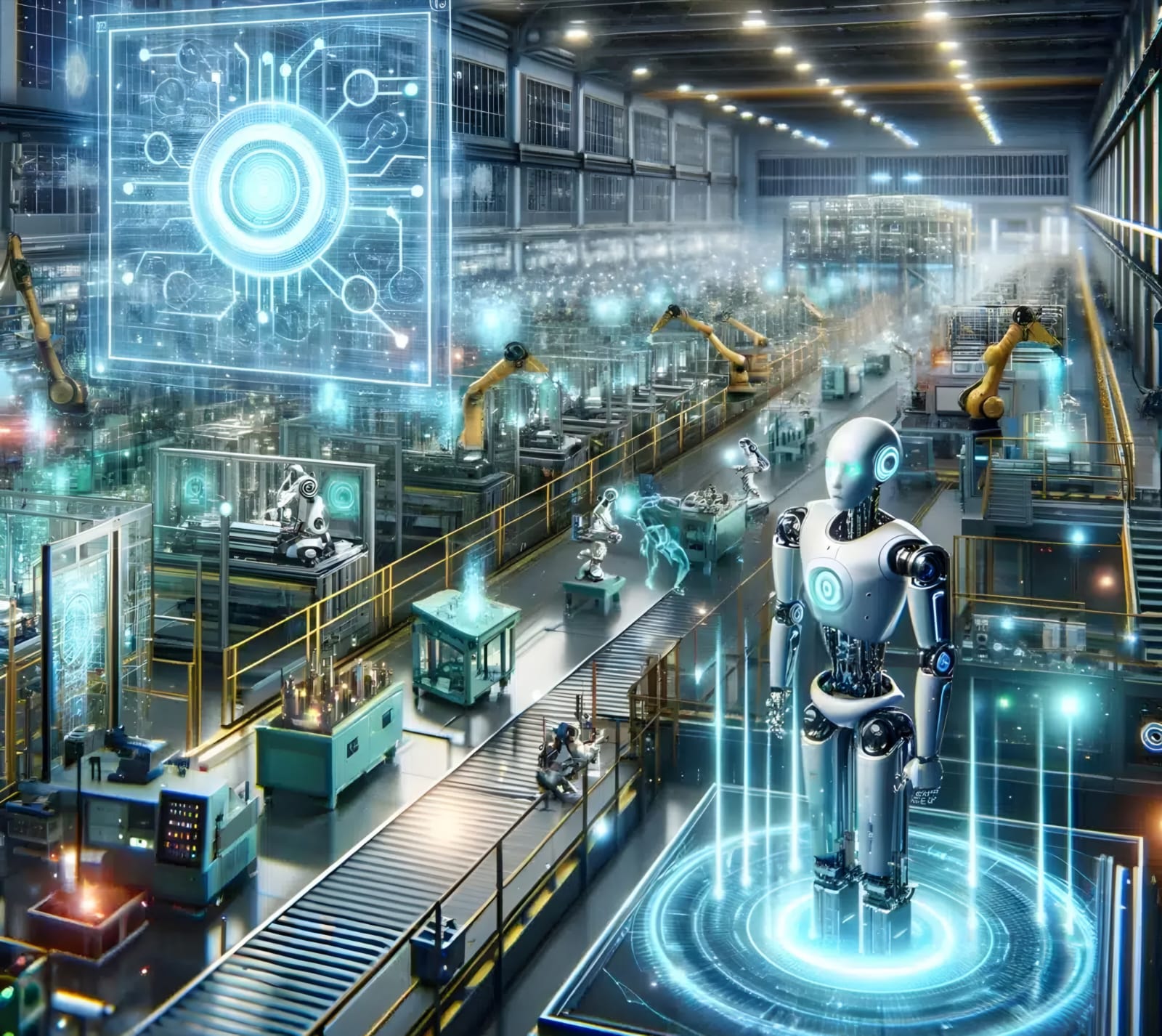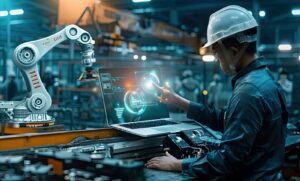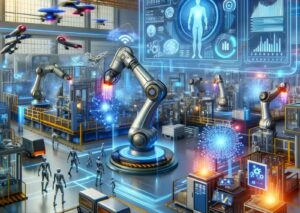
Contents
- 1 How Artificial Intelligence is Transforming Smart Manufacturing
- 1.1 1. Predictive Upkeep: From Downtime to Uptime
- 1.2 2. High quality Management Will get a Excessive-Tech Improve
- 1.3 3. Smarter Provide Chains with AI-Pushed Forecasting
- 1.4 4. Robotics and Human Collaboration
- 1.5 5. Course of Optimization with Machine Studying
- 1.6 6. Customization at Scale
- 1.7 7. AI-Powered Resolution Making
- 1.8 Challenges and Issues
- 1.9 The Highway Forward: A Smarter, Extra Resilient Trade
- 1.10 Closing Ideas
How Artificial Intelligence is Transforming Smart Manufacturing
Within the coronary heart of as we speak’s fourth industrial revolution—generally generally known as Trade 4.0—Synthetic Intelligence (AI) is main a silent transformation throughout manufacturing flooring worldwide. As soon as pushed primarily by handbook labor and mechanical automation, fashionable manufacturing is now evolving into one thing much more clever, adaptive, and environment friendly: Sensible Manufacturing.
However what does it actually imply once we say AI is “revolutionizing” good manufacturing? It’s greater than only a buzzword. AI is reshaping the very foundations of how factories function—making them extra responsive, data-driven, and able to self-improvement.
Let’s dive deeper into how AI is making a seismic shift within the manufacturing world.

1. Predictive Upkeep: From Downtime to Uptime
Historically, equipment was serviced both on a set schedule or after it broke down—each approaches inefficient and expensive. Enter AI-powered predictive upkeep, which makes use of sensors, historic information, and machine studying algorithms to predict failures earlier than they occur.
As an alternative of ready for a conveyor belt to cease or a motor to overheat, AI programs can now monitor vibrations, temperature, and strain in real-time to anticipate put on and tear. Producers profit from:
-
Fewer unplanned shutdowns
-
Prolonged gear life
-
Decreased upkeep prices
Corporations like Siemens and GE are already utilizing AI-driven platforms that may forestall thousands and thousands in losses by recognizing points days—and even weeks—earlier than failure.
2. High quality Management Will get a Excessive-Tech Improve
High quality management is one other space the place AI is making a major impression. Up to now, inspecting components for defects relied closely on human eyes or easy automation. AI has modified that with the facility of laptop imaginative and prescient.
Now, good cameras and imaginative and prescient programs can:
-
Detect microscopic cracks or inconsistencies
-
Be taught from new defect patterns over time
-
Analyze hundreds of merchandise per minute with higher accuracy than people
This doesn’t simply cut back faulty merchandise—it improves buyer satisfaction and minimizes waste. For instance, in electronics manufacturing, even the smallest soldering error can result in a failed product. AI ensures these errors are caught early, reliably, and persistently.
3. Smarter Provide Chains with AI-Pushed Forecasting
A wise manufacturing unit isn’t simply confined to the 4 partitions of the plant. AI helps producers make their complete provide chains extra clever.
By analyzing previous traits, market demand, climate patterns, and real-time logistics information, AI can:
-
Precisely forecast materials wants
-
Optimize stock ranges
-
Determine bottlenecks earlier than they impression manufacturing
This degree of perception helps producers keep away from overstocking or understocking and allows just-in-time (JIT) manufacturing with higher precision. In an period the place international provide chains are below fixed strain, AI is proving to be a useful navigator.
4. Robotics and Human Collaboration
Neglect the Hollywood picture of robots changing people. In good manufacturing, AI-powered robots—usually referred to as cobots—are designed to work alongside people, not change them.
These collaborative robots can:
-
Adapt to new duties with out complicated reprogramming
-
Be taught from human conduct
-
Help in bodily demanding or repetitive duties
This enables human staff to deal with higher-level decision-making and inventive problem-solving whereas robots deal with the heavy lifting or high-precision work. The consequence? Safer, extra productive workplaces.
5. Course of Optimization with Machine Studying
Manufacturing entails hundreds of transferring components—actually and figuratively. From uncooked supplies to completed merchandise, optimizing each step of the method is a mammoth process. However AI, particularly machine studying, thrives in such complexity.
Machine studying algorithms can:
-
Analyze real-time information from sensors, machines, and staff
-
Spot inefficiencies in workflows
-
Mechanically alter processes to enhance output
For instance, an AI system would possibly uncover that barely altering the velocity of a packaging machine will increase throughput with out compromising high quality. These small beneficial properties, when utilized throughout a manufacturing unit, can translate into large enhancements in general effectivity.
6. Customization at Scale
Mass manufacturing as soon as meant uniformity. However as we speak’s customers crave personalization—customized options, colours, or configurations. AI makes this potential with out sacrificing effectivity.
By integrating AI with CAD (computer-aided design), stock programs, and robotic manufacturing traces, factories can:
-
Adapt shortly to customized orders
-
Reduce changeover occasions
-
Keep manufacturing velocity with numerous product variations
This degree of flexibility opens new doorways for producers to supply mass customization, meet area of interest market calls for, and improve buyer satisfaction—all whereas remaining worthwhile.
7. AI-Powered Resolution Making
Maybe probably the most transformative facet of AI is its means to assist human decision-making. With dashboards, real-time analytics, and actionable insights, AI empowers plant managers and executives to:
-
Reply shortly to disruptions
-
Make knowledgeable strategic choices
-
Determine traits they wouldn’t have seen manually
AI doesn’t change human management—it enhances it by turning information into intelligence.
Challenges and Issues
Whereas the advantages are clear, AI adoption in manufacturing isn’t with out its hurdles:
-
Preliminary prices for good sensors and AI software program could be excessive.
-
Expert expertise is required to handle and interpret AI programs.
-
The safety of information and privacy remain persistent concerns associated with devices connected to the cloud.
Nevertheless, with the fast development of inexpensive IoT gadgets and user-friendly AI platforms, these limitations have gotten simpler to beat—even for mid-sized producers.
The Highway Forward: A Smarter, Extra Resilient Trade

The mixing of synthetic intelligence into manufacturing is just not a passing pattern—it’s a foundational shift. As AI continues to mature, we’ll see factories that aren’t simply automated however clever, able to adapting to vary in real-time, and resilient towards international disruptions.
Ultimately, AI is not only revolutionizing good manufacturing—it’s redefining what manufacturing is.
Closing Ideas
Whether or not it’s rising uptime, enhancing product high quality, or enabling unprecedented customization, AI is quietly however profoundly remodeling the world’s factories. For producers keen to embrace the change, the rewards are usually not solely operational—they’re strategic and long-term.
The query isn’t if AI will change your business, however how briskly you’re keen to adapt.
